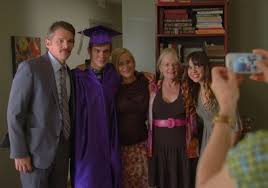“I cannot remember when a film has moved me more or captured so well all the colors and shadings of the personal, yet universal process of becoming.” Rhapsodic as Betsy Sharkey gets in her review of Richard Linklater's new film, Boyhood, she's far from alone. Even the normally somewhat flinty Manohla Dargis gushes, “It’s a model of cinematic realism,” in the New York Times. “Even after seeing the film three times, I haven’t fully figured out why it has maintained such a hold on me, and why I’m eager to see it again.” The film seems to be a sort of party for critics, inviting their purplest prose.
What is this, Tolstoy?
Hey, Linklater brought it up. But let’s hold that thought for a bit.
By now you’ve probably heard of the innovative idea behind Boyhood: film a family drama over the course of twelve years. As Linklater has put it in interviews, time itself becomes a character (or in other interviews, a collaborator). But then, Linklater has always been fortunate in his collaborators.
Now if you are making a movie about aging, in real time, your lead actress is going to be the trickiest part. Get Nicole Kidman (or almost any mainstream actress) from the ages of 31 to 43 and you’re going to see: almost nothing. Maybe a few Botox side-effects. But Linklater, in the first of many uncanny moves on this picture, chose the exception. One of our most fearless and physical actresses, Patricia Arquette has actually allowed time to do its business and thus is able to play an aging single mother, with untold stresses, convincingly.

She brings other strengths as well. Arquette has always been able to project a lot, including intelligence and determination. That’s key here, since she plays a woman who, stuck in a dead-end job with two small kids, manages to put herself through college and eventually becomes a psychology professor.
She’s also always shown a remarkable ability to project emotion without words. Consider Beyond Rangoon(1995) where she spoke maybe two words, but was able to hold our attention, or the television show she starred on from 2005 to 2011, Medium , where she played a psychic. The woman has access to wordless realms, which is an important counterbalance when it comes to Linklater, who can occasionally, let’s face it, run to the gabby.
Linklater has said he was more or less just kicking the idea around until he met six-year-old Ellar Coltrane, the son of a musician he followed on the Austin scene. Coltrane goes from dreamy child to dreamy adult, with a few intriguing awkward years in between. Like Arquette, he’s charismatic without being especially verbal, which is another nice restraint for Linklater. ( The critics are almost unanimously praising what goes unsaid in the film.) It also doesn’t hurt that as an eighteen-year-old. Coltrane suggests a combination of River Phoenix and James Dean.
Speaking of imminent doom, with its welcome lack of a conventional storyline, Boyhood must provide something in its place. In a number of scenes Linklater dangles what all our narrative-senses alert us are extremely dangerous situations: junior high kids drink beer in an empty house and play throwing Chinese stars (those round, jagged hatchet-things). An alcoholic stepfather drives the kids around while plastered, a teenager drives toward his graduation party while sipping from a flask. Shotguns are wielded.These scenes hold our attention, albeit in a somewhat cheap way, while the movie does its work on a deeper level. "Nothing happens"-but rest assured that time will pluck every rose.
Boyhood has frequently been compared to the 7 Up series, the British documentary which tracks a group of schoolchildren over an even longer period of time. But in place of the endless fascinations of a varied group of real people, Linklater is working with the relatively confined canvas of one fictional American family. The challenge is to provide enough narrative charms to propel the story forward while retaining focus mainly on the passage of time itself rather than some invented story.
Linklater draws on all the tricks he’s developed over his two decades of work; indeed, Boyhood echoes individual Linklater films at various points, especially as Mason, the boy of the title, heads toward adolescence. Linklater has always been our most important poet of teenage angst and possibility. As Mason, the boy of the title, begins to make his rounds through Texas coffee shops, taking drugs and philosophizing with his stunning girlfriend, we experience the ghosts of Linklater past: from Slacker to the Before Sunrise series.
If to me there is an essential immaturity to Linklater’s vision, there’s no denying he’s done dazzling work here. When an aged Patricia Arquette weeps at the kitchen table contemplating Mason's departure to college, the jokes she makes about her imminent death (“Haven’t you skipped over about 40 years, Mom?,” Mason joshes back) work on a conventional "empty nest" level about pathetic middle aged women. But Arquette is so committed, and her physical aging so achingly evident, that we also seem to be experiencing the Sublime, that is, to confront our own oblivion, all that we cannot comprehend.
By somehow packing an enormous amount of raw life into his novels, Tolstoy expanded the possibilities of the realistic novel. By the conclusion of Boyhood, the comparison Linklater himself has invoked doesn’t seem like such a stretch; he really has managed to infuse American filmmaking with some much needed oxygen.
By somehow packing an enormous amount of raw life into his novels, Tolstoy expanded the possibilities of the realistic novel. By the conclusion of Boyhood, the comparison Linklater himself has invoked doesn’t seem like such a stretch; he really has managed to infuse American filmmaking with some much needed oxygen.
--Grace Lovelace

This sounds like a gem of a movie. Including the trailer was a nice touch, giving the passage of time the poignant face of a young boy.
ReplyDelete